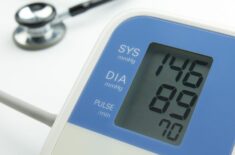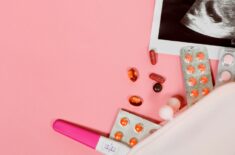Overview
As many as 52% of pregnant women are anemic, but most of them don’t even know it! (1)
Iron requirements during pregnancy increase in your body to provide enough for the baby’s needs.
That’s why moms-to-be are more likely to develop anemia than nonpregnant women.
But iron deficiency anemia can lead to bleeding, pre-eclampsia, low birth weight, stunted growth, and newborn anemia; thus, moms need to eat iron-rich foods and seek treatment before it’s too late. (2)
Still, it’s common for expecting moms to have low iron levels, especially during the later stages of pregnancy.
This usually doesn’t pose a threat to your baby as long as you can increase your iron levels through proper nutrition and supplementation.
Although some moms can get enough iron from food, most need supplementation to meet the daily iron requirements for a healthy pregnancy.
Can your prenatal supplementsprovide you with enough iron?
Continue reading to learn more.
Benefits of Iron: Why It’s Important During Pregnancy?
The human body needs iron for growth and development, but a pregnant woman’s iron stores get quickly depleted to create more blood for the baby.
Iron is among the essential minerals that the body needs to produce proteins in red blood cells called hemoglobin and myoglobin. These proteins help transfer oxygen from the lungs to the rest of the muscles and tissues in the body. (2)
Other uses for iron in pregnant moms and babies:
- Production of some hormones
- Neurological development
- Physical development and growth
Because iron is an essential component needed in pregnancy, the amount of iron in your body should meet these high demands.
The Dangers of Iron Deficiency Anemia In Pregnancy
You must maintain healthy iron levels in pregnancy because severe iron-deficiency anemia can have many adverse effects for both you and your baby.
Moms with iron deficiency may be at higher risk for these pregnancy outcomes:
- Bleeding or blood loss
- Pre-eclampsia (a serious pregnancy complication characterized by high blood pressure and other symptoms)
- Perinatal infection (risk of infection up to 1 year after birth)
- Cardiac failure may also develop in more severe degrees of anemia. (3)
But moms aren’t the only ones affected when iron levels are low during pregnancy.
Your baby can experience the following adverse outcomes:
- Stunted growth
- Low birth weight
- Premature birth
Which Trimester Is Iron Most Important?
Anemia during the first trimester puts babies at an increased risk of the following: (3)
- Abnormal cognitive development
- Birth asphyxia (lack of oxygen at birth)
- Perinatal mortality (stillbirth)
- Newborn anemia
Symptoms Of Low Iron During Pregnancy
Many pregnant women don’t even know they have low iron unless they’ve talked to their healthcare provider and have gotten tested.
The following are some symptoms of low iron levels during pregnancy: (4)
- Fatigue
- Alopecia (hair falling out in patches)
- Pica (a compulsive eating disorder involving the urge to eat non-nutritive items like dirt or sand.)
- Pagophagia (compulsive craving to eat ice)
- Uncontrollable urge to move legs (or restless leg syndrome)
However, because other nutritional deficiencies often accompany iron deficiency, it might be difficult for you to realize they’re due to iron deficiency. (2)
So, how do you check if you have anemia?
A blood test for hemoglobin will show whether you have enough iron in your body.
Pregnant women with the following HGB (hemoglobin) levels have anemia: (5)
- First trimester: less than 11 g/dl of iron
- Second trimester: less than 10.5 g/dl
- Third trimester: less than 11 g/dl
Other tests include checking for levels of the following:
- Hematocrit (percentage of red cells in your blood)
- Serum ferritin (percentage of ferritin, a protein that stores iron)
Serum ferritin levels lower than 12 mcg/l and hematocrit lower than 36% indicate anemia in pregnant women. (6)
How Much Iron Do Pregnant Women Need & When Should Iron Tablets Be Taken During Pregnancy?
Because there’s a higher demand for iron during pregnancy and lactation, you should increase your total iron intake throughout your entire pregnancy. (7)
RDAs (recommended dietary allowances) for iron are as follows:
- Pregnancy – 27 mg
- Lactation – 9 mg for moms
If you’re low on iron, these are the recommended therapy options:
- dietary modifications to include more iron-rich foods
- oral iron supplementation
- intravenous iron and blood transfusion (for severe deficiency)
Recommendations for iron supplementation vary depending on the source:
- WHO (World Health Organization): 30–60 mg of elemental iron per day
- CDC (Centers for Disease Control): 30 mg of elemental iron per day
Take note that 60 mg of this form of iron (elemental) is equivalent to:
- 500 mg of ferrous gluconate
- 180 mg ferrous fumarate
- 300 mg ferrous sulfate heptahydrate
Besides iron pills, WHO also recommends supplementing with 400 mcg or 0.4 mg folic acid for moms-to-be to help prevent folate-deficiency anemia. (8)
In serious cases where hemoglobin levels are lower than 7 g/dl, transfusions may be recommended to increase blood volume immediately.
Why You Might Need More Than The Recommended Daily Dose
Some expecting mamas might need more than the recommended daily dose due to the following reasons:
- Low iron stores pre-pregnancy
- Irregular iron supplementation before or during pregnancy
- Only started supplementing with iron later in pregnancy
- Carrying multiples
- Anemia caused by chronic disease
By receiving a higher dose, pregnant women with low iron stores can quickly improve their iron status.
Are you at risk of developing iron-deficiency anemia?
The prevalence of iron-deficient pregnant women is as high as 52% worldwide, with a higher percentage of women living in developing countries. (3)
The following are risk factors for iron deficiency:
- Blood donation more than three times per year before pregnancy
- Menorrhagia (menstrual flow that’s heavier than normal, loss of more than 80 ml of blood per month) before pregnancy
- Diets low in both meat and ascorbic acid (ie: vegetarian or vegan diets)
- Multiple gestations
- Chronic use of aspirin (9)
The Best Iron-rich Foods For Pregnant Women
Ready to give your baby the best nutrition needed for proper development?
You need 27 milligrams of iron per day for a healthy pregnancy.
Thankfully, you can get this amount from plenty of food sources.
In her online course on pregnancy nutrition, registered dietitian and celebrity nutritionist Kelly Leveque lists the following iron-rich foods to add to your diet for optimal nutrition during pregnancy: (10)
- Liver, 3.5 oz = 6.5 mg
- Bison, 6 oz = 5.4 mg
- Venison, 3 oz = 3.8 mg
- Dark chocolate, 1oz = 3.4 mg
- Lentils, ½ cup = 3.3 mg
- Clams, 3.5 oz = 3 mg
- Beef, red meat, 3.5 oz = 2.7mg
- Spinach, 1 cup = 2.7 mg
- Pumpkin seeds, 1oz = 2.5 mg
- Sardines, 3 oz = 2.5 mg
- Spirulina, 1 Tbsp = 2 mg
- Black beans, ½ cup = 1.8 mg
- Chicken, dark meat, 3.5 oz = 1.5 mg
- Quinoa, ½ cup = 1.4 mg
- Chicken, light meat, 3.5 oz = 1.21 mg
- Pork, 3.5 oz = 1 mg
- Lamb, 3 oz = 1 mg
- Turkey, 3.5 oz = 1 mg
- Broccoli, 1 cup = 1 mg
- Wild Salmon, 3.5 oz = 0.5 mg
- Beef, white meat, 3.5 oz = 0.4 mg
Types of Dietary Iron: Heme vs. Non-Heme Iron
Heme iron is only found in meat from animals. Meanwhile, non-heme iron is found in plants and also in meat from animals who eat plants.
It’s better to stick to animal sources of iron because heme iron is identical to the type of iron in our bodies.
Kelly Leveque explains it like this: (10)
“ Heme iron is the best form of iron, as up to 40% of it is readily absorbed by your body.
Nonheme is poorly absorbed, we’re talking less than 10% and it needs to be converted.”
What Can Increase Or Decrease Iron Absorption?
Our bodies don’t absorb all the iron we get from the foods we eat. Iron absorption is affected by other factors in the body.
The following can increase the absorption of iron:
1 – Foods rich in ascorbic acid (vitamin C):
- Citrus fruits and juices (Try splashing a dash of lemon or lime juice to your meats.)
- Apples
- Berries such as strawberries
- Dark green leafy vegetables
- Bell peppers
2 – Foods rich in vitamin A and beta-carotene:
- Red peppers
- Cantaloupe
- Sweet potatoes
- Spinach
- Apricots
- Oranges
- Peaches
- Carrots
- Kale
- Squash
3 – Red meat, poultry, and fish
Foods from animal sources don’t just provide us with heme iron; they also assist our bodies in better iron absorption. (11)
On the other hand, the following decrease iron absorption:
1 – Calcium supplements
2 – Antacids such as Pepto-Bismol, Calcium Carbonate (Alka-Seltzer), and Gaviscon
3 – Foods rich in calcium (like dairy products if you can tolerate them)
4 – Foods with phytate or phytic acid (natural substances usually found in plants):
- Legumes such as lentils, beans, and soy
- Whole grains (try to stick to gluten-free grains)
- Breakfast cereals
5 – Foods rich in polyphenols (micronutrient/antioxidant found in plants)
- Berries like blueberries, blackberries, açaí berries, raspberries, and strawberries
- Cocoa powder and dark chocolate
- Coffee
- Black and green tea
- Spices like cloves
- Nuts
- Non-berry fruits like cherries and plums
Here’s the good news: Absorption of heme iron sources isn’t greatly affected by these factors.
That’s why a 2000 study published in Critical Reviews in Food Science and Nutrition suggests the following in order to increase levels: (11)
- Increasing intake of foods rich in heme iron
- Simultaneous consumption of foods rich in vitamin C
- Avoiding tea or coffee during meals
A word of caution:
Caffeine can cross the placenta to reach your baby. Because the baby’s metabolism is still developing, this may affect your baby’s sleep pattern or normal movements.
So, it’s best to avoid drinking caffeinated drinks while you’re pregnant.
But if you really want to drink coffee or tea, ACOG (American College of Obstetricians and Gynecologists) recommends limiting your intake to less than 200 mg per day. That’s just about 1 or 2 cups of regular coffee. (12)
Are Iron Supplements Safe During Pregnancy?
A pregnant woman’s body needs more iron. Studies suggest that taking an iron supplement can help prevent iron deficiency anemia. (13) (14)
Mothers taking supplemental iron with up to 90 mg of iron have an 8.4% risk of having babies with lower birth weight compared to a 10.2% risk for moms with no supplementation.
In a 2012 review of iron supplementation during pregnancy, the mean birth weight was higher by 31g for infants whose mothers had iron supplementation. It also showed a lower risk of preterm birth. (15)
Because anemia appears to have more impact on the baby during the first trimester, supplementation should be provided as soon as a woman knows she’s pregnant. (16)
Thankfully, most multivitamin and prenatal supplements sold in the US provide enough iron content (27 mg) per serving. (17)
Besides checking for iron in prenatal vitamins, you should also look for ones with vitamin D (400 IU) and calcium (200-300 mg) for your baby to have healthier bones and teeth.
It’s also good to check prenatal supplements for the following vitamins:
- Folic acid or folate (400 mcg)
- Iodine (150 mcg)
- Vitamin B12 (6mcg)
- Vitamin C (70 mg)
- Niacin (20 mg)
But supplements come with different types of iron. Dietitian Kelly Leveque suggests, “Iron Bisglycinate is the right form, Fersifumierate or Sulfate are the wrong forms.” (10)
Instead of the wrong forms of iron, she suggests taking gentle chelated iron (Iron Sulfate) and Ferrous Bis-Glycinate chelate.
The best iron supplements come in slow-release forms.
Our bodies can absorb more iron from slow-release iron supplements than regular, rapidly disintegrating tablets. However, these slow-release tablets are usually more expensive than regular ones. (18)
Is Too Much Iron Bad For Pregnancy? Potential Side Effects Of Iron Supplements
Too much iron can also be unhealthy because our bodies can only store a certain amount of nutrients. (19)
If you’re taking iron supplements, you might experience the following side effects:
- Nausea
- Constipation
- Diarrhea
- Vomiting
It’s also important to take iron supplements with food because these can damage the stomach lining if taken on an empty stomach. (19)
Tips For Proper Iron Supplementation
Iron is actually best absorbed in an acidic environment; thus, it’s ideally taken on an empty stomach. But because doing so could also irritate the stomach lining, it’s better to eat a small amount of food before taking your iron tablet.
Don’t take antacids, milk, or calcium supplements along with your iron pills. Drink it with a glass of lemon water or fresh-squeezed orange juice instead.
For pregnant women who have trouble taking hard pills, prenatal gummies are also available. But it’s always best to check the label if the dietary supplement contains at least 27 mg of iron.
Postpartum Iron Needs
The WHO (World Health Organization) recommends continued iron supplementation (30–60 mg of elemental iron per day) for three months postpartum to improve the health of moms and their babies, especially in areas where anemia prevalence is high in pregnant women. (20)
REFERENCES
(1) https://www.ncbi.nlm.nih.gov/pmc/articles/PMC4375689/
(2) NIH (National Institutes of Health) Office of Dietary Supplements. Factsheet. https://ods.od.nih.gov/factsheets/Iron-HealthProfessional/
(3) https://www.ncbi.nlm.nih.gov/pmc/articles/PMC4375689/
(4) https://www.ncbi.nlm.nih.gov/pmc/articles/PMC5885006/
(5) CDC. (Centers for Disease Control and Prevention and Prevention). https://www.cdc.gov/mmwr/preview/mmwrhtml/00051880.htm
(6) https://academic.oup.com/ajcn/article/81/5/1218S/4649796
(7) https://pubmed.ncbi.nlm.nih.gov/10871591/
(8) World Health Organization. WHO e-Library of Evidence for Nutrition Actions (eLENA). https://www.who.int/elena/titles/guidance_summaries/daily_iron_pregnancy/en/
(9) Institute of Medicine (US) Committee on Nutritional Status During Pregnancy and Lactation. Nutrition During Pregnancy: Part I Weight Gain: Part II Nutrient Supplements. Washington, DC: National Academies Press (US); 1990. 14, Iron Nutrition During Pregnancy. Available from: https://www.ncbi.nlm.nih.gov/books/NBK235217/
(10) https://kellyleveque.com/pregnancy
(11) https://pubmed.ncbi.nlm.nih.gov/11029010/
(12) https://pubmed.ncbi.nlm.nih.gov/18591330/
(13) Cogswell ME, Parvanta I, Ickes L, Yip R, Brittenham GM. 2003. Am J Clin Nutr. PubMed. https://pubmed.ncbi.nlm.nih.gov/14522736/
(14) https://pubmed.ncbi.nlm.nih.gov/12816784/
(15) https://pubmed.ncbi.nlm.nih.gov/23235616/
(16) https://www.acog.org/clinical/clinical-guidance/committee-opinion/articles/2010/08/moderate-caffeine-consumption-during-pregnancy#
(17) https://dsld.od.nih.gov/dsld/
(18) https://pubmed.ncbi.nlm.nih.gov/1064905/
(19) https://www.ncbi.nlm.nih.gov/books/NBK279574/
(20) https://www.who.int/reproductivehealth/publications/maternal_perinatal_health/iron_folate_supplementation.pdf












